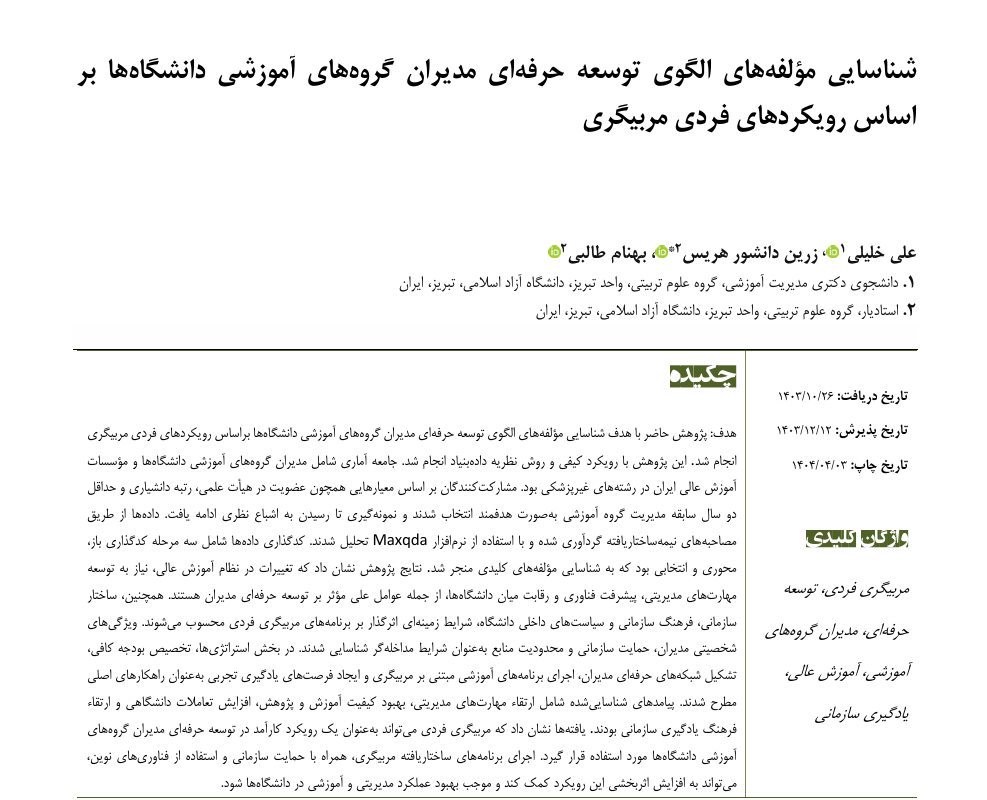Identifying the Components of the Professional Development Model for University Department Heads Based on Individual Coaching Approaches
Keywords:
Individual coaching, professional development, university department heads, higher education, organizational learningAbstract
This study aimed to identify the components of the professional development model for university department heads based on individual coaching approaches. The study employed a qualitative approach using grounded theory methodology. The statistical population included department heads of universities and higher education institutions in Iran in non-medical fields. Participants were purposefully selected based on criteria such as faculty membership, associate professorship, and a minimum of two years of experience as a department head. Sampling continued until theoretical saturation was achieved. Data were collected through semi-structured interviews and analyzed using Maxqda software. The coding process involved three stages: open coding, axial coding, and selective coding, leading to the identification of key components. The results indicated that changes in higher education policies, the need for managerial skill development, technological advancements, and competition among universities were the causal factors influencing the professional development of department heads. Organizational structure, institutional culture, and university policies served as contextual conditions impacting individual coaching programs. Intervening conditions included the personal characteristics of department heads, organizational support, and resource constraints. Identified strategies included allocating sufficient funding, establishing professional networks, implementing coaching-based training programs, and creating experiential learning opportunities. The recognized outcomes comprised enhanced managerial skills, improved quality of teaching and research, increased academic collaboration, and the promotion of a learning-oriented organizational culture. The findings suggest that individual coaching can be an effective approach to the professional development of university department heads. Implementing structured coaching programs, supported by organizational backing and the integration of modern technologies, can enhance the effectiveness of this approach, ultimately leading to improved managerial and academic performance in universities.
Downloads
References
Abdollahi B, Sadin Aa, NavehebSrahim a, abassiyan h. Designing a professional development model for faculty at Farhangian University with a grounded theoretical approach and a mixed exploratory paradigm. ieaajournal. 2022;11(2):41-83. doi: 10.52547/meo.11.2.41.
Bilal, Guraya SY, Chen S. The impact and effectiveness of faculty development program in fostering the faculty’s knowledge, skills, and professional competence: A systematic review and meta-analysis. Saudi Journal of Biological Sciences. 2019;26(4):688-97.
Guilbaud TC, Martin F, Newton XA. Faculty Perceptions on Accessibility in Online Learning: Knowledge, Practice and Professional Development. Online Learning. 2021;25(2). doi: 10.24059/olj.v25i2.2233.
Hejazi A. Determining the components of professional development of faculty members of Farhangian University. Research in Teacher Education (RTE). 2020;3(1):41-61.
Lim SM, Patel NS. Coaching in Higher Education. 2024:3-17. doi: 10.4324/9781003332176-2.
Lim SM, Patel NS, Shahdadpuri R. Coaching Students in Higher Education. 2024. doi: 10.4324/9781003332176.
Filatova O, Barabashkina EV, Komkova A. Coaching in an Educational Organization. The Tidings of the Baltic State Fishing Fleet Academy Psychological and Pedagogical Sciences (Theory and Methods of Professional Education). 2024(3(69)):212-4. doi: 10.46845/2071-5331-2024-3-69-212-214.
Hunaiti Z. Introducing Coaching to Higher Education. 2021:1-20. doi: 10.4018/978-1-7998-4246-0.ch001.
Ward CL, Reneau CM. Holistic Coaching in Higher Education. 2021:162-80. doi: 10.4018/978-1-7998-4246-0.ch008.
Buberwa E, Nzulwa J, Kamaara M. Effect of Employee Coaching Practices on Universities’ Performance in Tanzania. Science Mundi. 2024;4(1):63-71. doi: 10.51867/scimundi.4.1.6.
Horváth Z, Wilder RS, Guthmiller JM. The Power of Coaching: Developing Leaders and Beyond. Journal of Dental Education. 2024;88(S1):671-7. doi: 10.1002/jdd.13535.
Shohel MMC, Ashrafuzzaman M, Mahmud A, Islam MT, Alam AS. Coaching Applications and Effectiveness in Teaching and Learning in Higher Education. 2021:21-47. doi: 10.4018/978-1-7998-4246-0.ch002.
Pisklova MV, Bekoeva M. Technology of Pedagogical Coaching as a Basic Model of Supporting the Personal Development of Students. SHS Web of Conferences. 2021;121:02001. doi: 10.1051/shsconf/202112102001.
Ismatova MS. Development of Coaching Technologies in the Educational Space of the University. Current Research Journal of Pedagogics. 2021;02(05):134-41. doi: 10.37547/pedagogics-crjp-02-05-25.
Savchuk B, Султанова Н, Bilavych H, Pantyuk T. Two-Tier Model Оf Training Future Teachers for Coaching at Out-of-School Institutions. Pedagogika-Pedagogy. 2022:177-95. doi: 10.53656/ped2022-2.03.
Takei H, Anthony PJ, Fountain E, Williams L. Empirical Development of the Best Practices of Coaching and Mentoring for High Performance of Competency-Based Education. International Research in Education. 2022;10(1):1. doi: 10.5296/ire.v10i1.19393.
Dzikovska M. Coaching as the Pedagogical Technology in Professional Training of Future Specialists. Continuing Professional Education Theory and Practice. 2019(3):45-50. doi: 10.28925/1609-8595.2019.3.4550.
Mohammadisadr M, Siadat SA, Hoveidā R. Identification and Validation of Coaching Skill Components Among Faculty Members of Universities. Educação E Pesquisa. 2018;44(0). doi: 10.1590/s1678-4634201844185441.
Thomson B. Coaching in Higher Education: A Case Study. 2018:205-14. doi: 10.4324/9780429473036-13.
Woodcock C. Executive Function Coaching in Higher Education. 2024. doi: 10.3102/ip.24.2092116.

Downloads
Published
Submitted
Revised
Accepted
Issue
Section
License
Copyright (c) 2025 Ali Khalili (Author); Zarrin Daneshvar Heris (Corresponding author); Behnam Talebi (Author)

This work is licensed under a Creative Commons Attribution-NonCommercial 4.0 International License.










